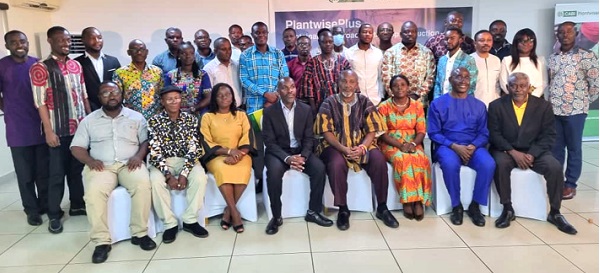
Africa must increase food production - UN report
Africa needs to increase its annual food production by 70 per cent by 2030 to enable it to sufficiently feed its citizens, a United Nations (UN) report has warned.
If not done, the continent risk suffering from food insecurity.
Advertisement
Indeed, experts project that the continent’s present population of about 1.3 billion will increase to about 2.5 billion by 2030.
Therefore, with more mouths to feed, it is projected that Africa has to increase its food production by 70 per cent at the same time.
At the launch of a new programme to support farmers to prevent a range of plant health issues, improve food security and protect livelihoods in Accra, the Chief Director at the Ministry of Food and Agriculture, Patrick Robert Ankobiah, said that major crops that were important for food security and income generation in Africa were often affected by production constraints due largely to limited knowledge of best practices.
He said the Food and Agriculture Organisation (FAO) estimates that annually up to 40 per cent of food crops were lost due to plant pests and others.
Also, he said smallholder farmers continued to use highly toxic plant protection products that were not sustainable for agriculture production and were potentially harmful to human, livestock and environmental health.
“Not only does plant health have implications for food security but also has health implications. These challenges are also experienced here in Ghana where small-scale farmers represent the vast majority of farmers who generally experience low food yield of staple food crops with an occasional marketable surplus,” he said.
“Increase in climate events, outbreaks of pests such as the fall armyworm and high input prices can contribute to low production levels. Therefore, any programme that will address some of these factors of food insecurity is very welcomed,” he said.
‘PlantwisePlus’
Dubbed ‘PlantwisePlus’, it is a new Centre for Agriculture and Bioscience International (CABI)-led worldwide programme that will also work in partnership with the Ministry of Food and Agriculture (MoFA), Plant Protection and Regulatory Services Directorate (PPRSD), Environmental Protection Agency (EPA Ghana), Ghana Green Label Scheme and the Council for Scientific and Industrial Research.
Mr Ankobiah commended CABI and its partners for developing the programme that aims to further strengthen the national plant health system.
Ghana is one of the six PlantwisePlus countries that will effectively serve to prove the concept’ for the programme in its delivery of digital innovations. These will bring efficiency to plant health management and have strong potential for broad application.
The other countries are Kenya, Pakistan, Zambia, Bangladesh and Uganda.
According to the Regional Representative of CABI for West Africa, Dr Victor Attuquaye Clottey, said PlantwisePlus builds upon CABI’s Plantwise and Action on Invasives programmes and would particularly empower farmers to increase income, food security and food safety amid a changing climate, which could exacerbate crop losses.
He said the new programme also sought to accelerate the availability of nature-positive and low-risk plant protection products to reduce reliance on high-risk farm inputs.
“Special emphasis will be placed on improving extension services for the country’s female farmers who have limited access to extension advisory services, including plant health services due to various challenges.
“This often contributes to a gender gap in agricultural productivity which if closed, could help boost agriculture production and improve the welfare of rural households,” he said.
Extension services
PlantwisePlus has already been working with the Women in Agriculture Development Directorate (WIAD) and the Agricultural Extension Services Directorate, both under MoFA, to see how extension services for women can be improved.
The programme conducted an assessment — using the Gender and Rural Advisory Services Assessment Tool (GRAST) developed by the FAO — to measure how gender-sensitive the delivery of extension services was in the country.
This led to a series of recommendations that include recruiting more women to lead farmers as extension contact farmers, supporting women farmers by covering transportation costs and offering on-site childcare facilities and encouraging women’s groups to diversify and engage in the production of new crops.
Other works, as part of the Plantwise programme in Ghana — and working with the PPRSD — included the Pest Risk Information Service (PRISE) which used state-of-Information Centres (CICs) to increase the yields of maize.



